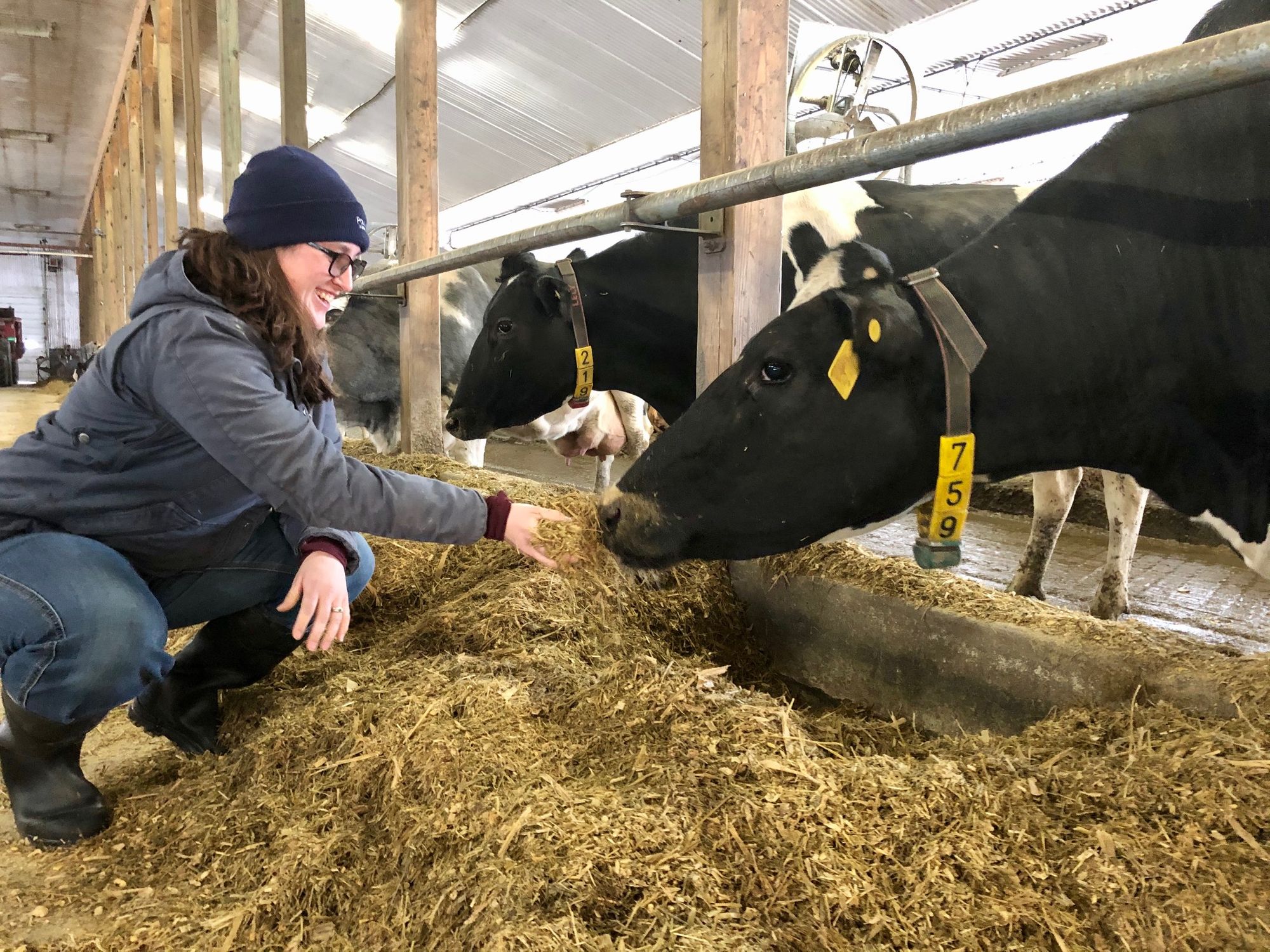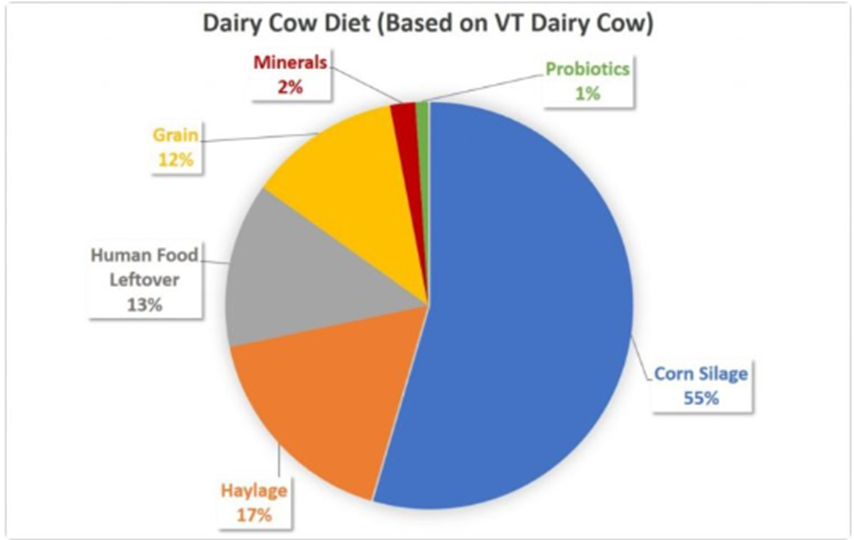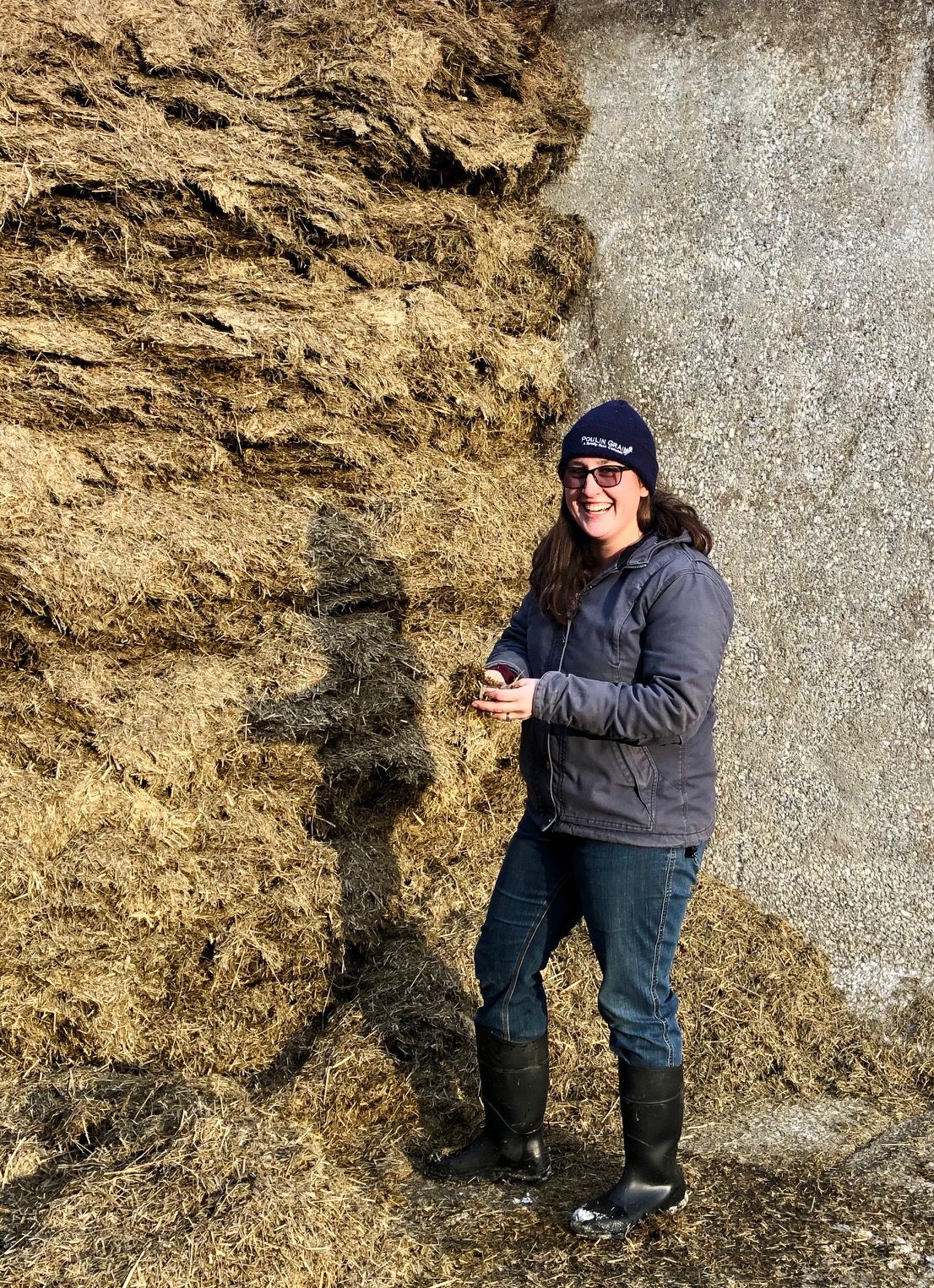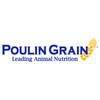Tell us about yourself and your background.
I live in Addison County Vermont with my husband and our one and three year old boys. We have our own little farm and spend all of our ‘spare’ time with our animals. We have poultry, a small beef herd, a family milk cow, two donkeys, four horses and too many goats. I enjoy riding our horses, scooping poop, and watching our kids grow up understanding and appreciating life on the farm.
What made you want to become a dairy nutritionist and how did you do it?
I knew I wanted to work in the dairy and agriculture community, and I was always fascinated with the nutrition aspect and the role it played in a farm’s success. I started studying this at the University of Vermont, participated in the CREAM dairy management program, and finished my undergraduate studies at Miner Institute. After graduating, I worked on a dairy farm for a year and then started in a field data tech support position at Poulin Grain, collecting and organizing data from farms to help them make informed management decisions for improved herd health and profitability. Over time I grew into the job I do now, working with farms to develop the best diets possible for their cows.
Describe your role as a dairy nutritionist and what a typical day might include.
My role as a dairy nutritionist is to work with the farmer and the cows to reach the farm’s goals. It is important for a farm to maintain the healthiest herd possible, and proper nutrition is key to making that happen. I work with the farmers to balance diets for the herd based on forages that the farm grows and grains or supplements that they purchase. I make sure that the cows are actually consuming the proper diet, and I help farms to analyze records and make management changes that will help to meet these goals.
On a typical day, I head out to farms first thing in the morning and take a walk through the herd. I can get a lot of information by observing their body language, habits, and surroundings. I check the feed bunks, take samples of the forages to be tested at our lab, talk with the farmer about how the cows are doing, any changes or concerns either of us have, and what we are going to do that week to reach the farm’s goals. Sometimes we also talk about the weather, our families, or the industry. After I have visited all of the farms for the day, I head home and jump on the computer to adjust diet formulas and make changes based on lab results or ideas we discussed that day.
How often do you visit the farms that you work with?
I visit most farms once a week, or once every 2 weeks, but I am always available to the farmers for questions or support.
How often do you update diets for the herds that you work with?
I update diets for the cattle any time the farm is feeding new forage, or any time the feed sample results indicate a change in nutrients. Most of the time this means that a farm’s diets are being checked or adjusted two to three times a month. Sometimes more often depending on the farm’s needs!

What do cows eat?
In this area of the country, farms normally grow and harvest corn silage (the whole corn plant chopped up), and grass or alfalfa haylage. These forages are the basis of the cow’s diet, and grain or supplements can be added to meet additional requirements for total energy, fat, protein, carbohydrates, vitamins and minerals. There is no “one right way” to feed a dairy cow. There are many ways to work with the feeds that are available to accomplish a well balanced diet.
Within the herd, there can be many different groups of cattle based on age, stage of lactation, and level of milk production. We formulate different diets for these groups to support their growth, production or pregnancy needs.
How are cows’ digestive systems different than humans’ and how does this affect what they can eat?
Cows are ruminants, which means they have four stomach chambers that feed travels through before it reaches the small intestine, whereas humans only have one. When a cow swallows her meal, the first place it hits is the reticulum and the rumen. These chambers house microbes that ferment and break down the cellulose in her feed, making the cow able to eat forage products that humans are incapable of digesting. These rumen microbes work in a symbiotic relationship with the cow. The cow makes a perfect anaerobic environment for them to live, and in turn the microbes help provide the cow with nutrients.
Her feed then goes through the omasum where water and some essential nutrients are absorbed. The last chamber before the small intestine is the abomasum, which is the most similar to the human stomach. Here, acids and enzymes further digest the feed material, and the cow actually digests those microbes that were produced back in the rumen. When the microbes die off and are digested, they become a source of protein for the cow.
This cool digestive system makes the cow an amazing recycler of products that humans cannot utilize as food. Cows make highly nutritious milk out of byproducts from the human food industry that would otherwise go to waste. Some examples are beet pulp (a byproduct the sugar industry), wheat middlings (a byproduct of the flour industry), distillers grains (a byproduct of the ethanol industry), and soy bean meal (a byproduct of vegetable oil production).

What types of information do you take into consideration when formulating a cow's diet?
Some of the information is easy to decipher like the cows weight, how much she eats, how old she is, if she’s pregnant, and how much milk she is producing. We also regularly take samples of the stored forages grown on the farm, and get them tested in our lab so that we can account for the real nutritional values in the feed. Other information that we need to take into account is a bit harder to decipher, like how much corn silage or haylage we can feed per cow per day and have enough to last until next year’s harvest.
What other troubleshooting or helpful services do you offer to farms that you work with?
While I might be the one that the farm sees regularly, we have a diverse team of specialists behind us that offer many helpful services and solutions for dairy farmers. Josh Poulin , the owner of the Poulin Grain, has his own herd of dairy cows, and understands on a personal level what challenges farmers are up against on a daily basis. We have team members with extensive experience maximizing results while minimizing feed cost for the farmer, and consultants with practical world class nutrition knowledge. We have two great veterinarians on staff, Dr. Rossiter, and Dr. Horn that are available to help us work with the farmer and the farm’s vet to tackle any health related challenges, or troubleshoot management issues that may arise. We have two Spanish interpreters that are available to help farmers with communication challenges with their employees. We also offer a records management service where we collect data from the farm and put it into a quick and easy to read report for the farmer.

How does your role play into the needs of dairy farms and their families?
A lot of what I do goes beyond the typical dairy nutritionist job description. If that means helping the farm to prepare for a meeting at the bank, helping trailer animals to a new location, or chatting about a difficult family issue, I am available. I would have never anticipated how close I have grown to some of the farmers and families that I work with.
How do you invest in your professional development, stay current with the latest info and technology, or keep a competitive advantage for your customers?
Our company hosts frequent training for our team which is always packed full of the latest research and information. We also attend many scientific and industry meetings, shows and seminars. I keep up with quite a few industry publications, and really enjoy participating in continuing education courses through some of the country's top research institutions. Luckily, dairy farming and cattle care is something that sparks personal passion for me, it’s not just a “job”.
What is the biggest misconception that you wish people understood in regard to the treatment of dairy cows, their lifestyle or care?
Dairy cows are the basis to the farmer’s business, lifestyle, and well being. Farmers love and respect their cows and strive to do as well as they possibly can for them. Happy, healthy cows are the most productive and beneficial for a farmer. If you ever have questions about how a farmer cares for their animals, or the reasoning behind their actions, I highly suggest asking them.
What’s one thing that you want people to know about dairy farming or the foods that it produces?
ANY milk or meat on the shelf in ANY store is antibiotic free. When farmers sell meat or milk, it legally has be free of any antibiotic residue. There are extremely strict guidelines surrounding their use in food animals, and stringent testing is enforced to ensure that all dairy products on store shelves are safe. Don’t be fooled into thinking that an “antibiotic free” label makes a product different or better than any other. The number-one goal of farmers is to produce healthy, safe dairy products for their family and for yours!
What is the hardest part about your job, and what do you enjoy most?
The hardest part of my job is dealing with the unknown. There are times when you don’t know exactly what is going to happen when you make a feed change, or when you plant a new variety of corn. At times you don’t know why a cow is sick, how a person is going to react, or why and how the last group of heifers to calve in did so well. We have science, our own experience, and the experience of colleagues to help us try to predict the unknown, but when working with biological process, nothing is certain.
I really enjoy the relationships that I have made with so many amazing people on this job. I love being able to walk onto a farm with a smile and help turn someone’s bad day around. We love what we do, the impact that we have, and the cows behind our favorite milk, cheese and ice cream!

To learn more about the services offered by Poulin Grain, visit: www.poulingrain.com or call 800.334.6731


